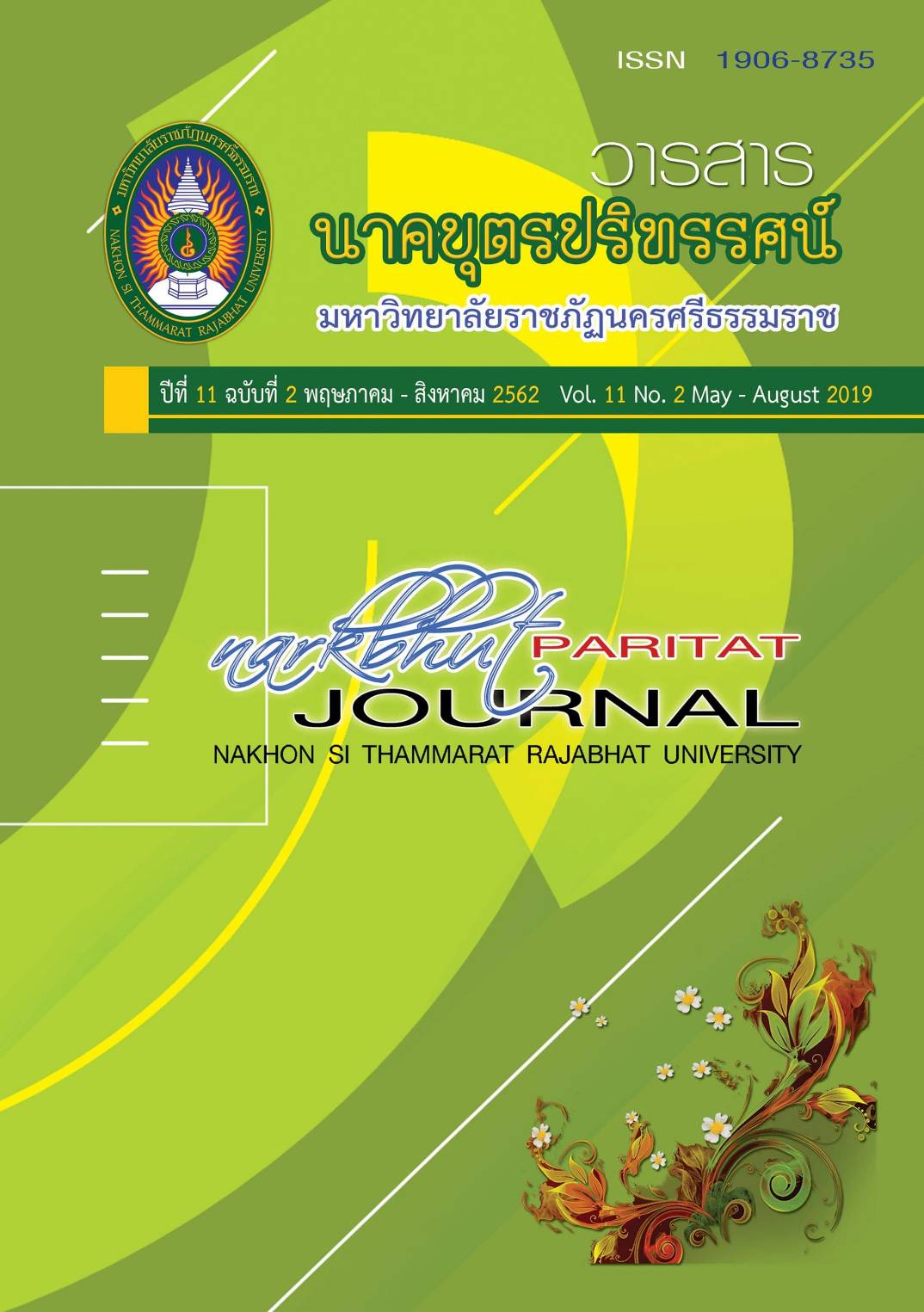กลยุทธ์การพัฒนาผู้เรียนสู่ความเป็นพลเมืองในศตวรรษที่ 21 Student Development Strategies for Being the Citizen in the 21st Century
Main Article Content
บทคัดย่อ
จากบทความนี้เป็นบทความวิชาการที่กล่าวถึง กลยุทธ์ (Strategy) ในการพัฒนาผู้เรียนในศตวรรษที่ 21 แผนการศึกษาแห่งชาติ พ.ศ. 2560-2579 ได้กำหนดวิสัยทัศน์ในการจัดการศึกษาเอาไว้ว่า “คนไทยทุกคนได้รับการศึกษาและเรียนรู้ตลอดชีวิตอย่างมีคุณภาพดำรงชีวิตอย่างเป็นสุข สอดคล้องกับหลักปรัชญาของเศรษฐกิจพอเพียง และการเปลี่ยนแปลงของโลกศตวรรษที่ 21” โดยมีเป้าหมายด้านผู้เรียนอยู่ที่มุ่งพัฒนาผู้เรียนทุกคนให้มีคุณลักษณะในการเรียนรู้ในศตวรรษที่ 21 ได้แก่ การอ่านออก การเขียนได้ และการคิดเลขเป็น มีทักษะด้านการคิดอย่างมีวิจารณญาณ ทักษะด้านการสร้างสรรค์และนวัตกรรม ทักษะด้านความเข้าใจต่างวัฒนธรรมต่างกระบวนทัศน์ ทักษะด้านความร่วมมือการทำงานเป็นทีมและภาวะผู้นำ ทักษะด้านการสื่อสารสารสนเทศและการรู้เท่าทันสื่อ ทักษะด้านคอมพิวเตอร์และเทคโนโลยีสารสนเทศและการสื่อสาร ทักษะอาชีพและทักษะการเรียนรู้ และความมีเมตตากรุณา มีวินัย คุณธรรม จริยธรรม โดยกลยุทธ์ หลักในการพัฒนาผู้เรียนให้มีคุณลักษณะความเป็นพลเมืองในศตวรรษที่ 21 ประกอบด้วยกลยุทธ์ 3 ประการ คือ 1) การพัฒนาสมรรถนะครูผู้สอน (teachers' capacity development) , 2) การพัฒนาการจัดการเรียนรู้ (learning management development) 3) การพัฒนาสมรรถนะของผู้เรียน(students’ performance improvement) ซึ่งกลยุทธ์ด้านการพัฒนาสมรรถนะด้านครูผู้สอน ประกอบด้วยการปรับกระบวนทัศน์ การปรับเปลี่ยนวิธีการจัดการเรียนรู้ และการปรับเปลี่ยนวิธีการวัดและประเมินผลผู้เรียน กลยุทธ์การพัฒนาการจัดการเรียนรู้ประกอบด้วย การพัฒนาหลักสูตรทุกระดับให้มีมาตรฐาน การพัฒนารูปแบบการจัดการเรียนรู้เชิงบูรณาการ เพื่อพัฒนาทักษะการคิดวิเคราะห์ การจัดการเรียนรู้ด้วยเทคโนโลยีและนำนวัตกรรมมาใช้ในการจัดการเรียนรู้ เช่น การเรียนรู้แบบโครงงาน การเรียนรู้แบบสืบเสาะ การเรียนรู้ด้วยกระบวนการวิจัยและรูปแบบการจัดการเรียนรู้แบบห้องเรียนกลับทาง (The Flipped Classroom) กลยุทธ์ด้านการพัฒนาสมรรถนะของผู้เรียน ประกอบด้วยการพัฒนาผู้เรียนให้เป็นบุคคลแห่งการเรียนรู้ การพัฒนาตนเองของผู้เรียน การพัฒนาสมรรถนะของผู้เรียนสู่ความเป็นพลเมืองในศตวรรษที่ 21
Article Details
เอกสารอ้างอิง
Education Reform Assembly. (2014). Thai citizens in the 21st century. Retrieved 2018, September 10, from https://www.facebook.com/EducationReform Assembly TH/. (In Thai)
Intaraprawat, P. (2017). Gentleman, Teacher, Athlete Associate Professor Dr. Chanchai Intaraprawat in remembrance of the royal cremation. n.p. (In Thai)
Kheamanee, T. (2015). Science of Teaching.(19th Edition ). Bangkok: Chulalongkorn University Book Center. (In Thai)
Lurenberg, Fred C. and Ornstien, Allan C. (2004). Education Administration. (4th Edition)., Belmont: Thomson Learning. (In Thai)
Ministry of Education. (2008). Core Curriculum for Basic Education, BE 2551. Bangkok: Community College of Agricultural Cooperatives of Thailand Demonstration School. (In Thai)
Office of the Royal Institute. (2008). Dictionary of Education, A-L. Bangkok: Arun Publications. (In Thai)
Office of the Royal Institute. (2011). Dictionary of Education, M-Z. Bangkok: Idea Square. (In Thai)
Pithiyanuwat, S. (2009). Measurement and Evaluation of Psychosocial Achievement. In Teacher Profession Encyclopedia of in Honor of King Bhumibol, (pp.115-121), n.p. (In Thai)
Praditthaworn,P. (2014). Key Performance of Administrator. Retrieved 2018, September 10. from http : taamkru.com /key Performance of students/.(In Thai)
Secretariat of the Council of Education. (2016). Thai Education in the 21st Century. Retrieved 2018, September 10, from www.one.go.th/index.php/book/BookView/1407. (In Thai)
Secretariat of the Council of Education. (2017). National Educational Plan BE 2560-2579. Bangkok: Chili Sweet Graphic. (In Thai)
Sergfovanni, Thomas J.and others (2004). Education Governance and Administration. (5th Edition). Boston: Peason Allyn and Bacon
Silpakorn University. (2016) Internal Quality Assurance Standards Basic Education. Retrieved 2018, September 10, from www.satit.sa.ac.th /home/images/documet/QC/7.pdf. (In Thai)
Sinthuwongsanont, M. (2013). Strategic Management for Success. In Watha, J. (Ed.), Principles of Management Education.( pp 203-216). Bangkok: PA. Living. (In Thai)
Sriklam, P (2014). A Study of Roles in Promoting Students' Desirable Characteristics in Fond of Being of Thai of the Teachers under the Office of Nakhon Ratchasima Primary Education Area office 1., Sikkha Journal of Education, 1(1) : 82-91. (In Thai)
Srikramkran, R. (2007). Learning Management. In (Edition.), Teacher Profession Encyclopedia in Honor of King Bhumibol, (pp.47-54) Bangkok: Secretariat Office of the Teachers Council. (In Thai)
Supalert, P. (2010). Learning Management. In (Edition), Teacher Profession Encyclopedia in Honor of King Bhumibol, (pp.159-152). Bangkok: Secretariat Office of the Teachers Council. (In Thai)
Thamsuan, K. (2014). The study of the desirable characteristics of disciplinary behavior of Prathom Suksa 6 students under the Office of Nakhon Ratchasima Primary Education Area Office 4. Sikkha Journal of Education, 1 (1) : 7-14. (In Thai)
Wimonsiri, P. (2016). 20-year-old national strategies Thailand's future for prosperity still stands Retrieved 2018, August. 28. from http//:www.nesdb.go.th. (In Thai)
Wongyai, W. (2016). Paradigms in Learning Assessment in the 21st Century. Sikkha Journal of Education, 2 (1) : 3-6. . (In Thai)


